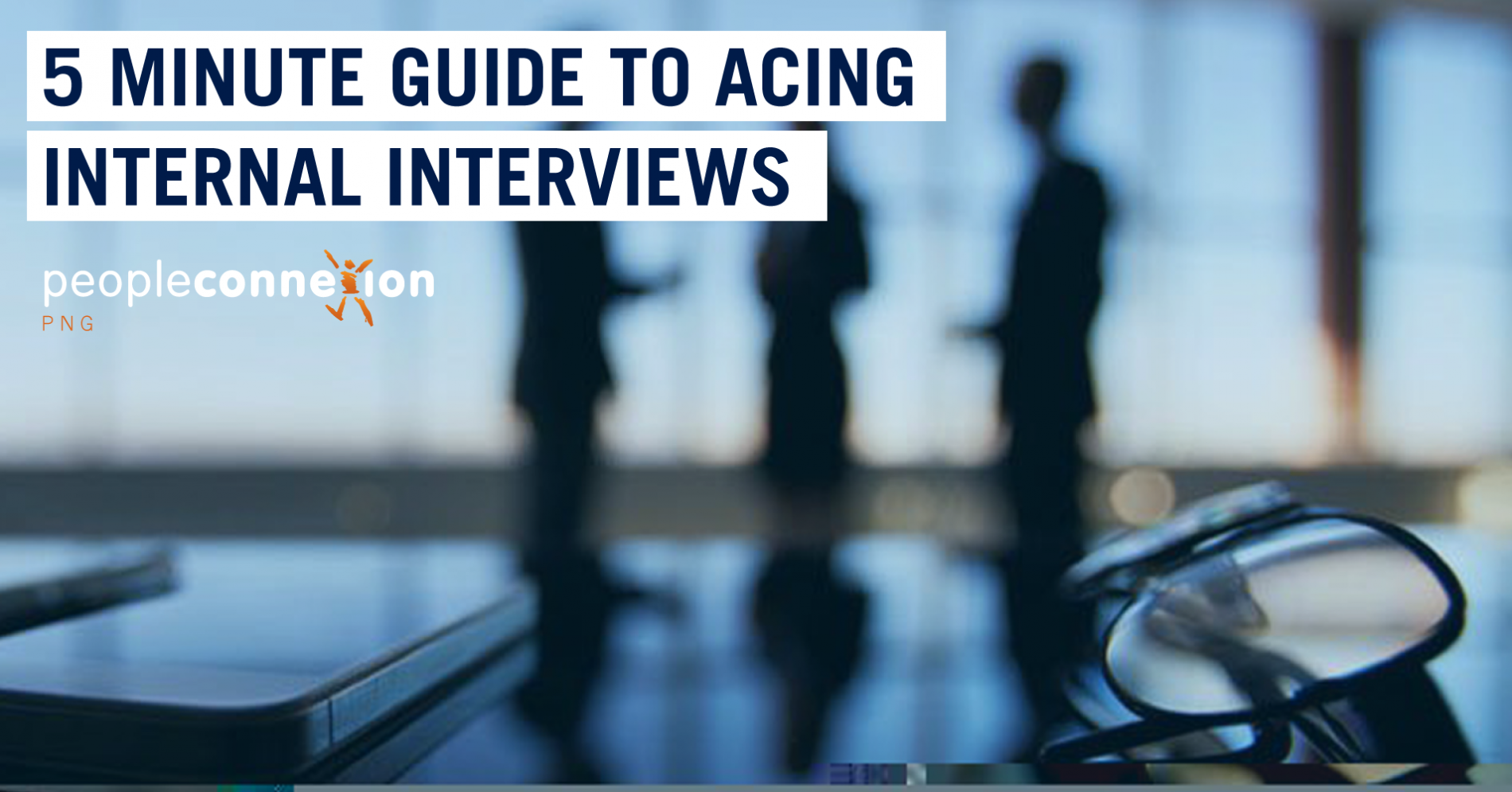How to Ace Your Internal Interview: A 5 Minute Guide
Applying for an internal role?
Whether it’s a promotion, a transfer or a sideways jump in your current organisation, it’s important to prepare for your internal interview properly and go in with the right expectations.
Here are five ways Peopleconnexion PNG have identified to help you put your best foot forward in your internal interview:
1. Consider whether you’re the best fit for the role
While many companies would prefer to hire internally, it can still be a major risk to fill a role with an internal candidate.
There is no doubt that existing employees already retain company and procedural knowledge, however, they also possess a series of habits and biases about how they ‘think? the job should be done.
These biases can be detrimental when they cloud your thinking and stop you from viewing a situation as objectively as a new candidate with ?fresh eyes? might.
By considering whether you really are the best fit for the role, you are gauging the tone of the whole interview (and predicting how much persuading you have left to do).
To determine whether you could be the suitable applicant for the role, ask yourself:
- Is the role a promotion in the same department/team or a transfer?
- Were you encouraged to apply?
- What are you looking for in your next role? Professional development? Leadership? Challenge? Better remuneration? Work-life balance?
- Will this role fulfil those needs?
- Where is the gap (if any)?
2. Act like an outsider (but utilise your insider advantage)
Treat an internal interview just as seriously as you would treat an interview at an external company. Ensure you research the strategic vision for the role thoroughly, and put the same effort into the interview as you would if you were an outside candidate.
Check out the company website or read through recent newsletters to stay up to date on company news, and find out which campaign the marketing/sales teams are running at the moment. This is the kind of research external candidates are likely to be undertaking, so it’s important to make sure you’re up to par.
To ensure your intentions translate well, dress appropriately, arrive at your interview at least ten minutes early and treat any administrative or support staff you greet on your way in politely and with professionalism. The trip into the interview isn’t the time to vent frustrations about delays on your current project or the right time to hold a lengthy personal conversation with a co-worker. Be sensible with your interactions and keep it professional.
Here’s where your ?insider? advantage comes in:
If you have a copy available to you, review the company’s annual reports and strategic vision reports. These documents will help you to understand your organisation’s broader vision and how the role you’re interviewing for might contribute to the delivery of long-term goals.
For example ? if you’re applying for a management position, you would be involved in departmental budget planning, hiring decisions and delivering on short and long-term goals. By understanding the context of the company’s performance, turnover and strategic goals, you can explain how you would help to achieve them as a manager.
If you’re applying for a technical position or operational support, your role would contribute to the organisation’s goals by developing internal expertise to make processes more efficient and contribute to the professional development of future staff.
When you understand why the role is important in the long-term and how you can fulfil the vision for that position, you can align yourself and your skills with the future of that role.
Think of it this way: if your interviewers can picture you in the position, you’re already ahead of your competition.
3. Know your reputation within the organisation
Ask yourself ? what preconceived ideas will the people in the interview room have of you?
External candidates have the advantage of coming in with a clean slate; the interviewers have only seen their CV (and maybe their LinkedIn profile).
As an internal candidate, you are coming into the interview with an existing reputation and your colleagues? defined ideas about your performance, attendance, attitude and capabilities. This can work in your favour, or against you.
Your interviewers have a real insight into your past behaviour and will use this to predict how successful you might be in the role. As a candidate, your role is to explain how you have learned from these experiences and will move forward positively.
If you aren’t sure what your reputation is or how you are perceived by your co-workers and managers, the best course of action is to ask!
4. Ask questions
The purpose of asking questions is to show your interest in the opportunity, and understand what the role will be like.
Don’t assume you already know what the position entails based on how you saw the last person fulfill the role. Your style and approach to daily duties and goals may be completely different to theirs.
To assist you in understanding more about the position, trying asking about:
- Day-to-day of the role (What should a day in this position look like?)
- Focus of the position (Is it client or customer facing? Will you be involved in strategy development or delivery? How much of the role is dedicated to managing others?)
- Biggest challenges and opportunities (How can you make the most impact in this role?)
- Where the role fits in the big scheme of things (Is there a succession plan in place or a long-term vision for the position?)
- The most important goals for the position (Ideally, what will this position achieve in the first month, 6 months, year?)
5. Share your accomplishments & future career goals
Finally, make sure you are sharing your motivation for applying for the role. Once you’ve listened to the plans for the position, it’s time to share your plans.
Outline some of your greatest accomplishments with the company and explain why they were so rewarding for you, and how they contributed to achieving your broader career goals.
By framing your achievements in this way, you help your interviewers/managers to understand your career aspirations and your desire to achieve more within the context of the organisation.
Tips for internal interview preparation:
? Don’t discuss your interview openly
Keep in mind that it may not be appropriate to discuss your interview or the role with your colleagues, given that your competition may include your co-workers.
? Ask HR if you should keep your manager in the loop
Depending on the situation (and the sensitivity of the role), you may need to let your manager know if you are moving through the recruitment process and will be moving on from your role. Ask HR about whether discussing your candidacy with your manager is the right move.
? Prepare thoroughly
Using the advice above, ensure you prepare for the interview thoroughly. Avoid treating it as a conversation about your development, but as a real interview. Take time beforehand to prepare yourself. Don’t schedule meetings or big projects right before or afterwards, give yourself time to prepare and debrief properly.
Internal interviews can be a fantastic opportunity to explore new avenues within your company and broaden your horizons beyond your current role. To make the most of your interview, ensure you are fully prepared and take a positive approach to put your best foot forward.
To access more advice from the Peopleconnexion team about interviews, careers and recruitment, you can head to www.peopleconnexion.com/news
Peopleconnexion PNG: Recruitment, Training, Payroll & HR Services
Your future is our business.





